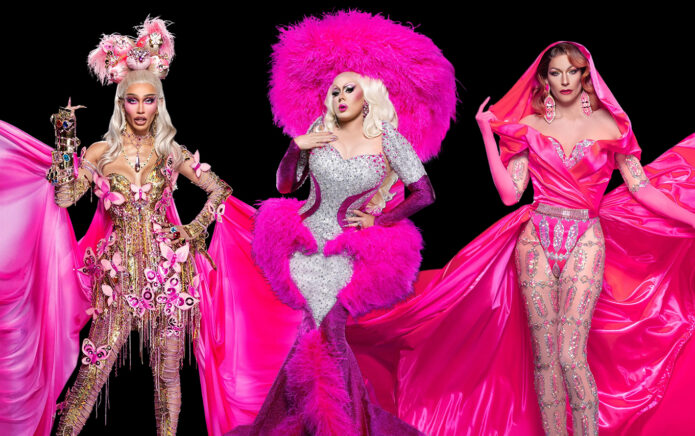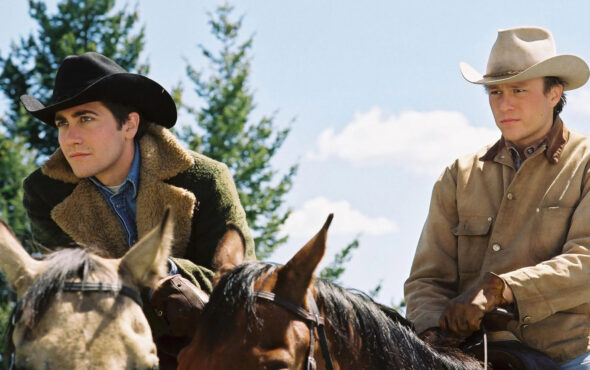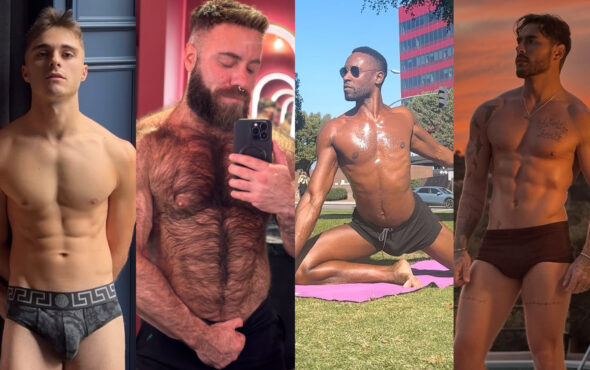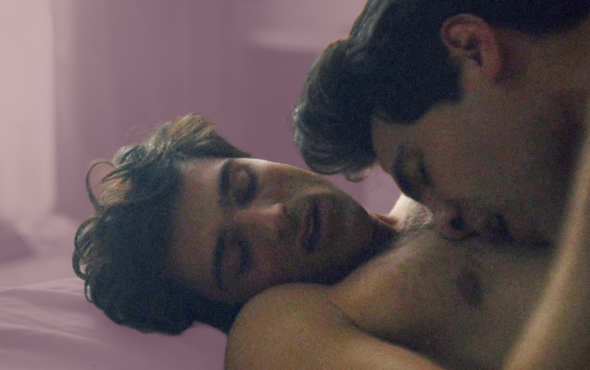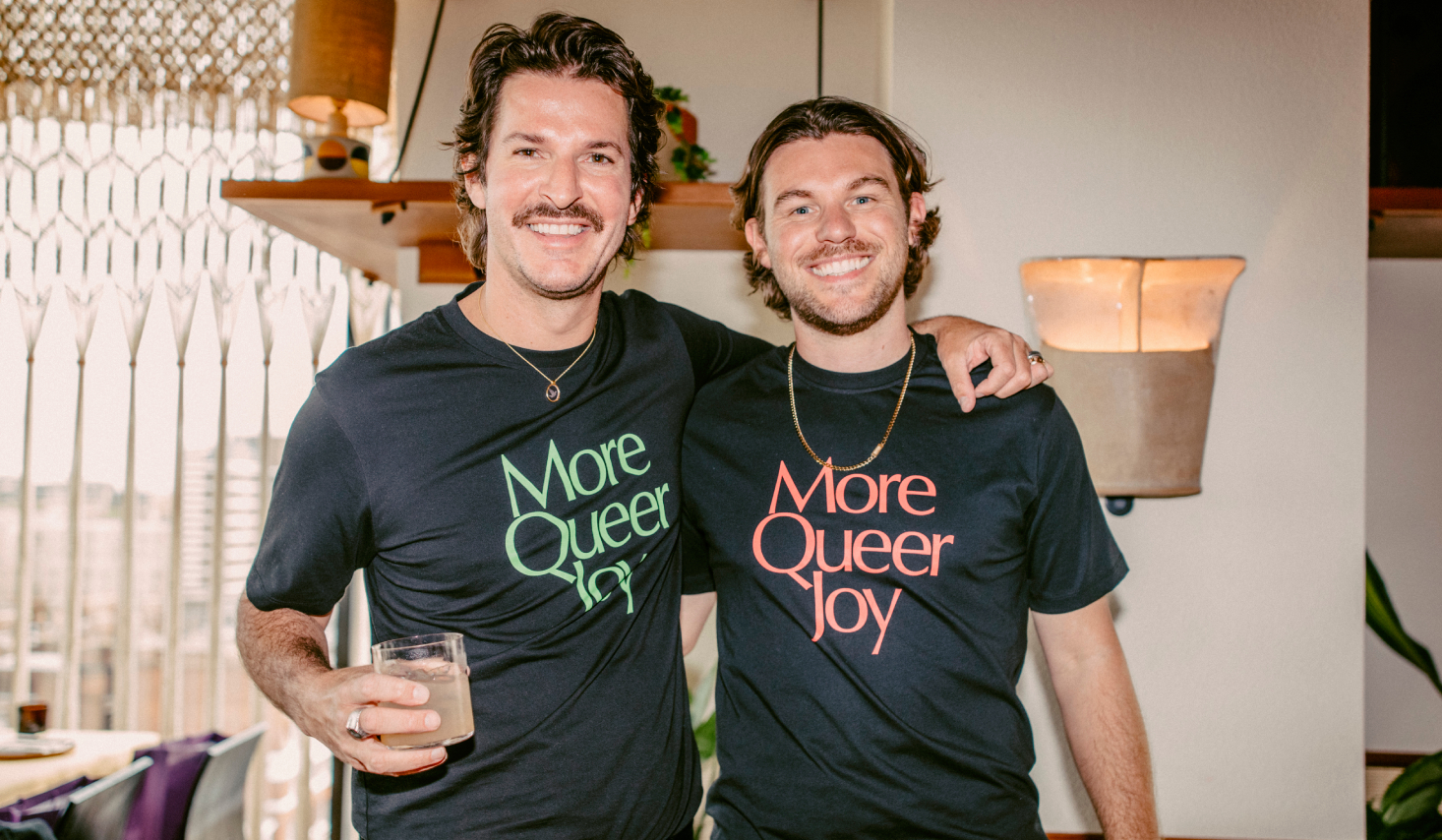
Glyn Fussell and Jamie Tagg love a bit of disruption. With their beloved LGBTQIA+ club night Sink the Pink, the duo injected some much-needed rainbow energy into a rather sanitised and heteronormative industry, bathing queers in glitter and sweat for over thirteen years.
And over on the festival circuit, Fussell and Tagg are the masterminds behind Mighty Hoopla, the UK’s ultimate celebration of pop music that has played host to icons such as Nelly Furtado, Kelly Rowland, Anastasia, Kelis, Jessie Ware, En Vogue and Sister Sledge. Now, the creatives are aiming to bring that same energy over to the fundraising industry with their community-led foundation, Pink Noise.
“What we do is sometimes wrapped up in a camp bow and people don’t realise that, actually, Mighty Hoopla disrupted the festival industry. Sink the Pink disrupted clubland. With Pink Noise, we want to do the same. We want to change the traditional way of fundraising,” Fussell tells GAY TIMES.
The foundation, which launched on 14 June, aims to “support and strengthen” the most vulnerable members of the LGBTQIA+ community, with Rainbow Migration – which assists LGBTQIA+ people through the asylum system in the UK – and Not a Phase – a charity uplifting the lives of trans adults in the UK – as their beneficiaries. Read below for our full chat with Fussell and Tagg about the origins of Pink Noise, why the foundation is “for everybody” and the future of Mighty Hoopla.
GT: Glyn and Jamie, can you tell me a little bit about this new foundation and how it came to fruition?
Glyn: The foundation has been going for a really long time – since the pandemic, but this is the public reincarnation of it. We’d been doing such big events for a long time and alongside that had always been fundraising. With the pandemic, everyone lost their livelihoods and no one knew what was happening, so we assisted people with projects and smaller Pride events that needed help. We continue to do that, really. We did that with Sink the Pink, lots of amazing collaborations with brands, creating merchandise and raising money.
Jamie: In the pandemic, everyone went digital, obviously. When events returned, we realised that we could still keep money for projects and artists online, as well as offline. Then, as we’ve grown, we realised we have a duty to carry these revenues on in so many ways. We’re lucky now that, with our shows like Mighty Hoopla, brands do want to be involved with us and they want to be an ally of the community. This is another vehicle to give them a direct access into projects, communities and charities that need it the most, which is kind of where it was born from. We’ve been working on it for years but, like Glyn said, this is the first time we’re going public with it. The aim is to raise awareness and generate more revenue streams for the projects that are needed.
Glyn: In the past 10 years we’ve done some amazing projects for charities. We did a huge campaign with Comic Relief and created merchandise that raised an obscene amount of money with Not a Phase. A lot of the time, we lack a level of autonomy about where those funds go. Sometimes, when we bring money from brands and donate to charities, we have no say or idea where that money goes. For us as two people who have our feet firmly in the community, we see stuff happening and changing and moving, we wanted to create a foundation where we could react to those people who need it most.
GT: Wow, so after working on Pink Noise for three to four years now, how does it feel to launch it publicly?
Jamie: We didn’t wanna go too quick with it, because we wanted to make sure it worked and that we had the right revenue streams. It would be pretty tragic to launch something like this and have no one back it. Three, four years ago, Hoopla didn’t actually exist because of COVID, so we didn’t have a revenue stream to generate it with. Now we’re at a place where we’re very confident of our shows, but more confident of the brands we’re working with. Bear in mind, we have to be super selective about who we work with. We can’t take everyone’s money. We don’t want to. There’s a whole world of brands out there we can’t touch for a very good reason. The ones who do want to work with us have been so receptive [to the foundation], so it’s been great timing for us. We want to be super transparent, too, about where the funding is going.
Glyn: We did it the right way round. We actually did the work. We’ve been raising money behind-the-scenes, doing a lot of projects and creating these online and physical fundraising-based events. It’s let us figure out what resonates with us and the community. We now know what it is that Pink Noise aims to do.
View this post on Instagram
GT: For those who are unaware, can you tell us about the work you do with both Not a Phase and Rainbow Migration?
Glyn: We both work with Not a Phase, they’ve been our main beneficiary of Mighty Hoopla for some time. I also worked with them for Sink the Pink and I’m a trustee. They uplift the lives of trans people across the UK in various ways, whether that’s self-defence classes or get-togethers or therapy sessions. Rainbow Migration we’ve only just started working with, but what was really important is that we’re representing the most vulnerable members of our community. We don’t always think globally, and there’s some atrocities happening around the world right now. People are seeking asylum, or wanting to seek asylum in places that are relatively safe for them. Rainbow Migration funds their application and assists them through this horrific process.
GT: How do you hope to witness this foundation grow over the next year?
Jamie: For us, it’s purely how much we can start generating for our charity and projects. It’s not really about us or the team behind it. It’s about the money we can help raise for charities and projects that need it. Bear in mind, we will be putting more information out about how people can apply for funding, whether that’s a charity or individuals who have projects we think are important. That, and the fate of our success, will probably come down to how much we are raising for charities and projects we care about.
Glyn: It’s key to note that we are not a charity. We’re a foundation and we raise money and visibility on behalf of amazing charities. One thing that we do, and always have done, is collaborate. That is a key part of Pink Noise. We’ll collaborate with brands and members of our community. We’re in some way a gateway between our community and brands because we have experience in both. That’s quite a difficult bridge to gap sometimes, and we get to do that.
GT: Are there any plans to intertwine Pink Noise with Mighty Hoopla?
Jamie: They’re very much going to be intertwined. We are using our position of privilege in many ways for a positive way. The reason why we’re here is purely because of the community and an amazing audience [of Hoopla]. So, for us it’s completely intertwined that this is our platform to give back to that same community. They will stand on their own two feet as we have different ways of generating income beyond the festival, but it is vital that Hoopla is intertwined with this fund.
GT: Is there anything else that you’d like to share about Pink Noise?
Glyn: One thing that I’d like to say is that it is called Pink Noise because we are trying to be a little disruptive. What we do is sometimes wrapped in a camp bow and people don’t realise that, actually, Mighty Hoopla disrupted the festival industry. Sink the Pink disrupted clubland. With Pink Noise, we want to do the same. We want to change the traditional way of fundraising. It doesn’t need to be a gala dinner all the time where loads of people sit down and bid on a luxury yacht. That still has a place, but that’s not what we’re here to do. We’re here to engage and, sometimes, fundraising can feel not inclusive. It can just feel like for the more elite members of our community. We want to make sure that everyone can support: allies, people within the community, people with lower income. Pink Noise is for everybody.
Jamie: I think that’s a really key point. We’re not going to be doing black tie dinners, but Pink Noise will put on some fucking good parties as well that will raise money. We’re very lucky to do what we do, so we’re going to utilise our contacts in the festival and clubland worlds. So, supporting Pink Noise is probably going to be attending a really wild party. We’re going to do both ends of it.
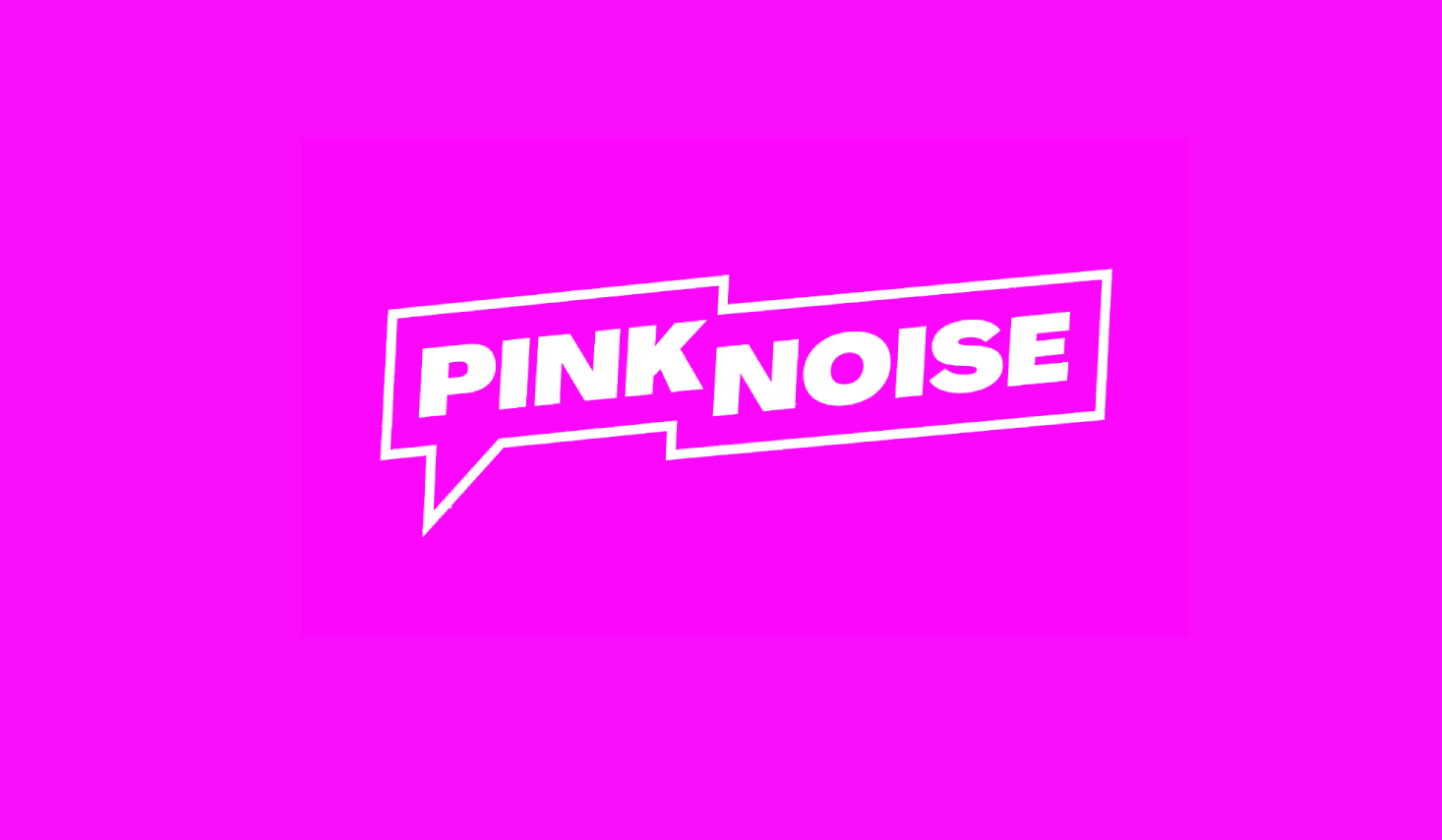
GT: Let’s talk a little bit about Hoopla because it has become a monumental annual event for the LGBTQIA+ community. How does it feel knowing that your creation brings together queer people from, not just the UK, but all around the world?
Jamie: A lot of tears and joy. I cry loads.
Glyn: Jamie is very serious about fun. He’s absolutely obsessive over details. On the Sunday when we’d gone through all the heartache of the weather, the wood-chipping and gay internet complaining about footwear, we were stood watching Jessie Ware sound-checking and Jamie was just… sobbing. Once the tears came he could not stop. I was like, ‘For god’s sake, I have to leave!’ But it does become a lot.
Jamie: It’s a lot, but it’s an absolute privilege to do what we do. An absolute honour. We’re only here because we’ve had such amazing support. People have been kind and supportive of our little dream. But, we do feel the pressure. When we put the lineup out there we go, ‘Christ, have we fucked it? Or have we nailed it?’ We’re not the kind of festival where we look and Spotify and say, ‘That’s popping off and doing well in the charts.’ We go with our instincts.
Glyn: It’s so nuanced. Hoopla is more than music. It’s a celebration of pop culture and queer culture and joy. Sometimes people are like, ‘It’s a nostalgic pop music festival’ and it’s really not that at all. We may be nodding to the past, but it’s very much in the future with the way that we’re thinking.
Jamie: We do feel the pressure to a certain degree as well, in a good way. It’s willing us on to book bigger and better and do more things and have more stages. It’s a lovely pressure to have, in many ways. It’s a funny little thing to run, I won’t lie.
Glyn: The biggest gift ever with Hoopla is when the ownership of something gets taken away from you. It’s kind of owned by the people who come, and it’s merely up to me and Jamie to steer the ship.
Jamie: Also, Hoopla is a lot of people’s first experience of the community as well. We have those people who’ve come for years and they’re part of the club and rave scene, but then we have people who have never been to a queer event before. They can be a bit nervous and I like to think that, when they leave, we’ve changed a few mindsets.
GT: In my opinion, you nail it every f***ing time.
Jamie: You’re getting free tickets!
Glyn: Every time!
GT: I’m so intrigued about the process for booking talent, because there’s a mixture of legacy acts, one-hit wonders and up-and-coming artists, as well as drag and cabaret performers. So, what does that process look like each year?
Jamie: Someone once said to us, ‘Can I make a documentary about the behind the scenes?’
Glyn: It wouldn’t be interesting.
Jamie: It’s just me and Glyn dicking around on Spotify going, ‘I love that, that’s great.’ There’s no secret behind it. I mean, we have a fantastic team of us and we have a team of bookers that specialise in the stages. The cabaret is booked by Cassie, who is phenomenal in the cabaret scene, then Toby books all the new music. We book some of the bigger stages, but it’s not just the two of us puppeteering.
Glyn: Also, whether we like it or not, we could be walking down the street and someone will come up to me and say, ‘Stacie Orrico – you’ve got to book Stacie Orrico!’
Jamie: It’s lovely that people do DM us their requests. By and large, it’s an honour that people are like, ‘Love Hoopla, I want to see this and this and this.’ Sometimes it’s just ‘[I want] Britney Spears, Christina Aguilera and Mariah Carey’ and I’m like, ‘Unless you want to pay for a £400 ticket, it’s not going to happen.’
GT: I’m sorry to tell you but I am going to be that annoying person, because I will be working on an article soon with my dream acts for Hoopla.
Glyn: Who is on it? I’m so intrigued.
View this post on Instagram
GT: Well, it’d be for stars who are actually possible.
Jamie: That’s the key.
Glyn: We’re going to be poker faced throughout all of this. Go on…
GT: For example… I’d love to see Ashanti, Missy Elliot, Alanis Morissette, Christina Milian, The Corrs and, because you secured Nelly Furtado, you need to complete the 2006-2007 pop trio with Gwen Stefani and Fergie. I think it’s possible!
Glyn: I love you, Sam.
Jamie: This is great. Come work for us. What’s so lovely about that is that a lot of our crowd adore pop music. We’re looking at an event at the end of the year that’s going to be a real celebration of that. There’s a lot of pop lovers, shall we say, who will love what we’ve got. For years, for Glastonbury and the big shows, ‘pop’ was a dirty word. Hoopla and our audience are reclaiming it like, ‘It’s not a dirty word, it’s fucking brilliant.’ So, you are exactly what Hoopla is all about.
GT: What kind of impact have you noticed Hoopla have on the artists, too? Because a lot of these performers don’t have new material out or they’re not touring, so it’s almost like reintroducing them to audiences, in a way.
Glyn: I will say, Louise decided that she wanted to make a whole new album because she played Hoopla and the response was so big. It’s strange to think that, when we started this, we were seen as silly and throwaway. No one took us seriously. Now, it could not feel more different. Artists are asking us to play, they’re turning up and trying to one-up each other like, ‘I must bring our foyr guests and have ten dancers.’ That is a testament to the success and how crucial and culturally important Mighty Hoopla has become. That’s fucking amazing.
Jamie: We were totally honoured when Sugababes wanted to have their first show back with us. There’s almost a precedent forming with artists like, ‘If we’re going to perform this, then we’re going to do it as Mighty Hoopla to your crowd.’ We’re on that radar with people. We’re very proud to be that vehicle, no doubt.
GT: I know you both have to remain tight-lipped, but who would be your dream Hoopla performer?
Glyn: I know Jamie’s straight off the bat.
Jamie: I’m the biggest Girls Aloud fan. I can’t even pretend. Glyn and I are seeing them with our partners on Saturday. I’m counting down the days.
Glyn: Mine is the more underrated Minogue, Dannii. I came out in 1998, when she had her ‘All I Wanna Do’ era, so she’s soundtracked by gay club life. There’s always been a club banger with Dannii in it. I want to see a show with all the hits. We’ve been trying! She’s my dream.
For more information on Pink Noise, visit their official website here.
And, if you haven’t already, visit Mighty Hoopla’s website to sign up for 2025’s ticket release.
